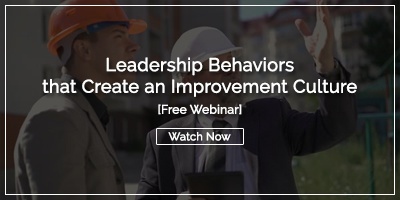
Companies dedicated to the practice of continuous improvement invest a lot of time and resources into training their employees and creating a culture centered around positive change. One way to make this easier and to smooth the path to improvement is to hire people who already have the right mindset.
Bringing up continuous improvement during the initial interview and throughout the hiring process lets the applicant know how important it is to your organization, and helps you weed out people who will be resistant to feedback and change.
If you ask the right questions, you can get a pretty good idea of whether the candidate is likely to be a good fit in your improvement culture and someone that the rest of the team will gladly welcome.
Here are some ideas of what to ask:
Is it OK for employees to point out problems or concerns, or should they trust that management has a reason for the way things are?
This is an excellent way to gauge how willing the candidate will be to share ideas and engage in improvement. Do you get a sense that this person will willingly point out opportunities for improvement, or would they prefer to just do what they are told? Does the interviewee demonstrate that they understand the difference between constructive feedback and complaining?
What is the most creative idea you’ve had for making your job better? Was it implemented?
Give the candidate a chance to wow you with their creativity. Even if the idea was never acted upon, this is a good way to learn more about how he or she thinks. If the idea wasn’t ever implemented, learn more about why. It could be that the organization was not willing to accept employee ideas, or it could be that the candidate was unwilling or unable to communicate effectively.
Tell me about a time you received feedback from your manager that resulted in improvement in your work.
This question will be revealing on many levels. First, it will be interesting to know what kind of feedback they received. Was it related to an action or an attitude? Next, how they respond will give you insight into how they view feedback and criticism. Do they portray the manager as a villain, or a collaborator looking to achieve a mutual goal?
When you face a difficult problem at home or work, how do you go about solving it?
You might get lucky, and someone will talk about PDSA or the 5 Whys, but that will likely be rare. Ideally, the answer will involve some form of gathering information to understand the current situation and the problem, exploring possible ideas for a solution, and implementing change. If they can give you an example, that would be excellent.
Have you had any training on continuous improvement or related methodologies?
You don’t need to disqualify someone who hasn’t had training or automatically assume that someone who has will be the right fit, but this question will help you know where you would be starting with this person. If they are unfamiliar with the approach, they will have the opportunity to ask about it, and you’ll be able to gauge the level of interest. It would be a great sign if they did some research about improvement in general or your specific methodology (Lean/Six Sigma) between the first and second interview.
How do you feel about failure? Should it be avoided at all costs, or is it OK if you learn from it?
This will be a tough question for applicants because who wants to tell a potential employer that failure is cool? I wouldn’t be too concerned if someone hedges their bets a bit, but you want to find people who know that every experiment that doesn’t work out isn’t the end of the world. This is a good time to introduce the idea of failing forward.
Can you tell me about a time you made a mistake at work and how you recovered?
This will tell you whether the candidate is willing to talk about problems, or if they would rather pretend they don’t exist. It will also give you a clue about their resiliency. Make sure the conversation focuses on the recovery aspect of the question more than the details of the error.
Talk about a time you worked as a team to solve a challenge at work.
Collaboration is an essential element of continuous improvement, so you want to be sure to learn more about the applicant’s approach to teamwork. Follow-up questions about how the team was led, how and why it was formed, and how the candidate felt about the results will also be revealing.
What were the strategic priorities of the organization you worked for last?
The answer doesn’t really matter, of course, what you want to know is whether the candidate was engaged enough to care. It certainly could be that the candidate doesn’t know because the organization’s leadership didn’t communicate effectively. If that is the case, explore how the employee felt about that and find out whether strategic goal alignment is something that they think is important.
Is there anything we could have improved related to the application process you’ve been through so far?
Here’s their chance to prove that they are willing to give you their thoughts in a situation where it might seem better just to say everything was perfect. Maybe they legitimately won’t have any feedback, but the discussion might provide some insight into their thinking, nonetheless. (Bonus, you might learn about ways you could improve the application process.)
There are no “right” or “wrong” answers to any of these questions, but they are effective ways to start the conversation about improvement and gain a better understanding of how the candidate will fit into your culture. Asking them, along with appropriate follow-up questions will give you a very good idea if you have someone who is willing to engage in continuous improvement or someone who would instead merely do the job the way its always been done.




Add a Comment